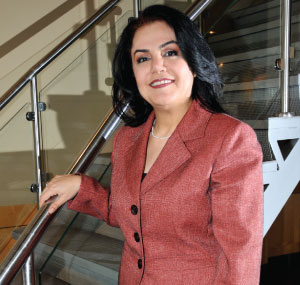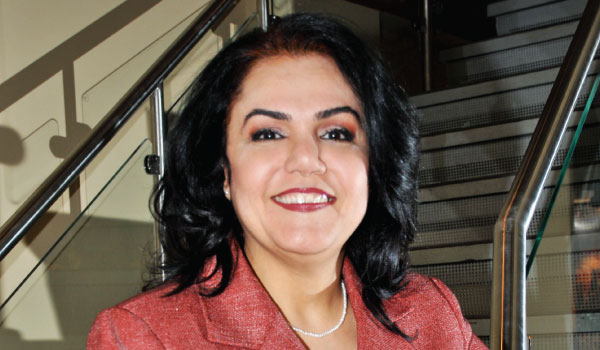Women’s rights have come a long way in Bahrain. We still have some distance to cover before we reach equality, of course, but maybe some of us are going about it in the wrong way. Natasha Bird talks to Suhair Al Ajjawi about her approach to being a career woman.
Feminists get a bad reputation. As a woman who often speaks openly about feminism, the eye-rolling and smirking that I am met with is more tiresome than troubling, but damaging nonetheless. Especially when it comes from another woman. Sure, too much of the same thing, whether it be impassioned speeches about women’s rights, campaigning outside of government buildings or a simple admission of support for the cause, might be boring or distasteful to some. But without it, where would we be?
When we look at the working world, the fact is that, until we experience proper equality — the removal of the glass ceiling, no more pay gap and fair, merit-based opportunities — the feminist movement needs to remain active.
However, feminism takes many forms. There are some that believe, probably misguidedly, that the only way to make a point is to shout it in somebody’s face. I myself am occasionally guilty of thinking that I need to make public declarations or take on an unnecessary challenge in the name of some greater good. There are others, though, who believe that many decisions, even small ones that go largely unnoticed, can contribute to a greater activism. I tracked down Suhair Al Ajjawi, one of Bahrain’s prominent businesswomen, to get her opinion on the subject.
 Suhair cuts an impressive figure. She’s been a senior manager at Ernst and Young, she did a stint as a director of corporate communications and she is currently responsible for developing the new retail marketing and sales department at the prestigious Al Salam bank.
Suhair cuts an impressive figure. She’s been a senior manager at Ernst and Young, she did a stint as a director of corporate communications and she is currently responsible for developing the new retail marketing and sales department at the prestigious Al Salam bank.
I ask Suhair about what she thinks being a career-woman means in the current climate. She acknowledges that, “Any type of work is challenging for a woman. Not only in the Arab world, but in the Western world too. I saw plenty of women being mistreated in the workplace in the UK.” This hasn’t stopped her in her tracks though. She challenges the misconception that all outspoken, driven Arab women get a tough time. “If you prove yourself here you can be the equal of a man,” she says, “As long as you work hard, doors are opened for you.”
Suhair also dismisses the idea that culture and tradition in the Middle East are what hold women back. There is a sense, often in countries outside of the GCC, that the patriarchy engendered by the Muslim religion will stunt a woman’s ability to succeed in the working world. “It is true,” she explains, “that men can find it difficult to take instructions from a woman. Tradition, culture, religion, background and education have all played a part in this. But there is actually an advantage here.”
“In the Arab world,” Suhair goes on, “the culture leads men to be more respectful when they speak to a woman and in the way that they treat her.”
“Yes there are limits”, she admits, “The glass ceiling is still visible. There is a level that a woman finds it hard to go beyond. It depends where you work. I have to say, my superiors are very supportive. In order to succeed you need to have drive and ambition, but you also need to be supported by your superiors and managers. I have been very lucky in this regard.”
Probably the most interesting thing that Suhair and I discuss is her opinion of what the modern feminist looks like. It is my belief that the current generation is still treading the pathway for those to come. We have to break new ground so that others can follow more easily. I ask her if she thinks it is important for women like her to be in the public eye — to be visibly working their way up the ladder in a big corporation as an example to others. Her answer isn’t quite what I expect. “I don’t care about showing myself to the world. When you do this, you do it for yourself,” she explains, “I have to satisfy myself and meet my own interests and prove things to myself. I do what I believe and what I enjoy and if the world sees, that’s fine.”
“What is the use of doing something to make a point, if you are actually miserable about it?” she goes on. “We spend such long hours in our jobs; we sacrifice time seeing our families to do it. You have to love it or it doesn’t make sense.”
The point that Suhair makes, I think, is that feminism, so far, may not have achieved total, unquestionable equality, but it has afforded women the luxury to choose the option that makes her most happy. Taking action and pursuing a career in finance, or any other predominantly male environment is great, if it is something that you are happy about and the idea that it might facilitate another woman’s career after yours is a great by-product. However, if you don’t like it, don’t do it just because you think you should. The feminist movement hasn’t fought all these years so that every woman can be the director of an international bank. It has existed so that women have the right to choose what they think they would enjoy; the career that would make them happy or the option that would most benefit them and the ones they love.
Finally, I ask Suhair to offer some advice to other women looking to embark on a new career. “Have passion for the job that you choose. To succeed, you have to be competitive, dedicated and really knowledgeable — not just technical knowledge about the product or service you are involved with, but also general knowledge. You really have to love it. To grow and progress and achieve your goals, passion is the most important thing,” she says. “And don’t ever be ashamed or embarrassed to admit when you don’t know something and to ask others for help.”


































